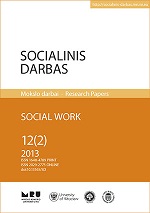Tarptautinė migracija struktūrinimo teorijos požiūriu
International Migration in the View of Structuration Theory
Author(s): Natalija ValavičienėSubject(s): Social Sciences
Published by: Mykolas Romeris University
Keywords: migration; social structure; cultural factors; structuration theory; capacity
Summary/Abstract: Contemporary international migration is specific by its own connectedness – it has the capacity to make multilayer connections with an individual, family, society or world contexts. It means that migration is a consequence of past events in history and at the same time it is the background for future events. This article proposes to look at migration through the lens of structuration theory, particularly as structuration process, which is perceived as social systems production and reproduction performed through social conduct. Structuration theory allows connecting micro and macro levels analytically, presents mutual interdependence between social structure and human agency rather than antinomy. This theory creates the background to research a reciprocal relation between individual and social structure, namely, it allows revealing interaction between migrant and social totality, by which it is influenced, where it is acting and what it changes by acting. In order to present theoretical context, macro and micro level migration theories and their applications in the works of authors of Lithuania are also reviewed in the article. The method of scientific literature analysis was applied and it enabled to understand international migration as a continuous interaction between migrants and economic, political, social and cultural contexts on macro level in sending and receiving countries. In the view of structuration theory, migration is seen as a recursive process, formed and transformed by active agents and itself shaping and structuring subsequent social behaviour of agents. Both structural determinants in the countries of emigration and immigration and acknowledgment of migration as an efficient strategy for life betterment create a new cultural element in the social structure that influences migration decision making of other people.
Journal: Socialinis darbas
- Issue Year: 12/2013
- Issue No: 2
- Page Range: 253-260
- Page Count: 8
- Language: Lithuanian

